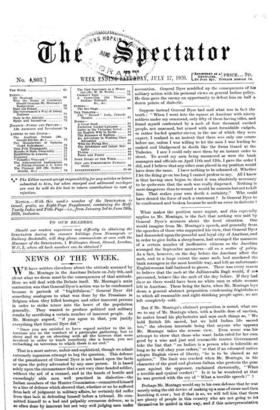Suppose instead General Dyer had said what was in fact
the truth : "When I went into the square at Amritsar with ninety soldiers under my command, only fifty of them having rifles, and found myself confronted by a mob of four thousand excited people, not unarmed, but armed with most formidable cudgels, or rather loaded quarter-staves, in the use of which they were expert, I realised in an instant that there WM only one course before me, unless I was willing to let the men I was leading be rushed and bludgeoned to death like the Swiss Guard at the Tuileries. I saw I could only save them by an instant order to shoot. To avoid my men being massacred as were the bank managers and officials on April 1 lth and 12th. I gave the order I did, and I believe that any other man placed in my position would have done the same. I have nothing to be ashamed of. Whether I let the firing go on too long I cannot profess to say. All I know is that having once begun to shoot it was absolutely necessary to be quite sure that the mob was really dispersed. Nothing is more dangerous than to wound a would-be assassin but not to kill him. That makes your own death a certainty." Who could have denied the force of such a statement ? Is General Dyer to be condemned and broken because he made an error in dialectic ?


































